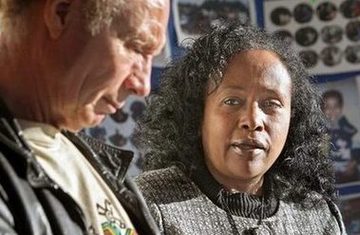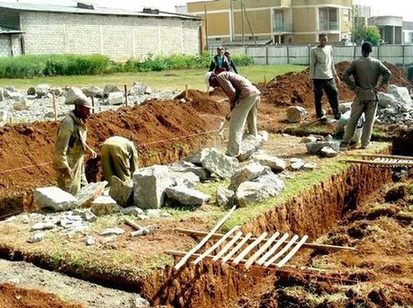
Above: Selamawit Kifle, right, founded the Blue Nile Children’s
Organization. At left is David Hornett, a board member.
By Jack Broom
Seattle Times staff reporter
A lot of people would have given up by now.
Many would have surrendered to the hassles of coordinating a project 11 time zones from home, or been choked by the red tape of dealing with a foreign government.
Still others would have succumbed to the difficulty of raising money for something most donors will never see.
But Selamawit Kifle, a South Seattle woman who grew up in Ethiopia, does not give up.
And because she does not, a clinic is rising from the red clay soil of her native land. Later this year, some of the poorest residents in one of the world’s poorest countries may be receiving treatment for malaria, tuberculosis, leprosy, complications of HIV/AIDS and other ailments.
“When I started, I had no idea what it would take,” said Kifle. “I just knew I had to help.”
Already, 63 Ethiopian orphans are receiving the basic necessities of life, along with school supplies and a chance at a better future, thanks to donors — nearly all in the Seattle area — who give $30 a month to sponsor a child through the Blue Nile Children’s Organization, which Kifle created in 2001.
“She is a very quiet, unassuming woman, but she is just a lion in terms of what she can accomplish. It’s amazing,” said Deacon Mary Shehane of St. Mark’s Episcopal Cathedral, which made Blue Nile one of its “Church in the World Ministries.” Next month, St. Mark’s will host a dinner and auction for the group; a similar event last year raised $20,000 toward the clinic construction.
The desperately poor Ethiopia which Kifle, 48, sees on her twice-yearly trips these days is not the country she remembers from childhood, when her upper-middle-class family had homes and property under Emperor Haile Selassie.
But a Marxist military regime that toppled Selassie in 1974 confiscated privately held property, including her family’s. In subsequent years, thousands of people were killed or simply disappeared, including a teenage brother and sister of Kifle’s. “The government took them away and we never saw them again.”
Kifle left Ethiopia in 1982 at age 22, following an older sister first to Germany and then to the United States.
Thirteen years later, Kifle, who then operated an import-export company, made her first trip back to Ethiopia, and was heartbroken by the plight of the country’s children.
“When you walk down the street, they follow you, begging for bread. If you go out early in the morning to church, you see them sleeping outside, piling up with each other to be warm,” she said. “I know I can’t help all of them, but if I can help even 100 kids, I’ll know I’ve done something.”
According to the U.S. Centers for Disease Control, more than 1 million children in Ethiopia alone have been orphaned by the AIDS epidemic sweeping through sub-Saharan Africa, and that total is expected to rise.
Setback alters goal: Read more at The Seattle Times.


























